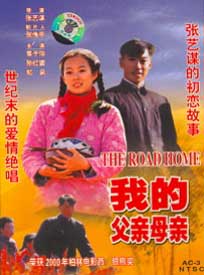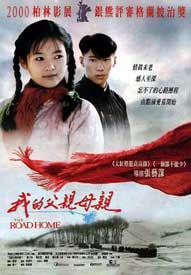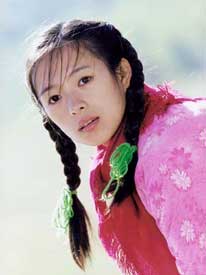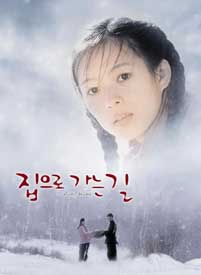In The Road Home (Wo de fu qin mu qin, 1999), businessman Luo Yusheng (Sun Honglei), living in the colorless souless city, returns to his isolated mountain village when he hears that his mother Zhao Di (Zhao Yuelin) needs him. The change from the black & white city to the color of the rural environment is Dorothy's journey from Kansas to Oz.
 Upon arrival he learns his father had died suddenly & unexpectedly while visiting another villages. His stoic mother is making stubborn, unreasonable seeming demands for the funeral. Upon arrival he learns his father had died suddenly & unexpectedly while visiting another villages. His stoic mother is making stubborn, unreasonable seeming demands for the funeral.
An old tradition, no longer observed, requires that the body be brought home by mourners on foot, so that the departed's ghost will never forget the way.
This just isn't done any more, & the fact that he died in another village would be a considerable walk. But his mother will not waver, & a filial son cannot vetoe a mother's wishes.
In flashback we see the youth of his mother Zhao Di (Zhang Ziyi, in the role that launched her now-gigantic career) & how she met the schoolteacher Luo Chengyu (Zheng Hao) when she was eighteen years old, when he came to teach in her village.
Their courtship came to be a legend in the village, for it is not only truly a romantic tale, in a romanticized setting, but young Di in selecting & pursuing the man she will devote her whole life to has broken a medieval tradition of arranged marriages that have nothing to do with love.
Content-wise The Road Home has many of the touchstones of Zhang Yimou's best known films, but more subdued, simpler, less lush, though no less lyrical.
The handheld camera has not been his usual approach, & it gives The Road Home a low-budget look, unexpected from this painterly & often saga-driven director. But the visual simplicity suits the story, & is one of its strengths.
 If it has a fault, it is in sentimentalizing life as a peasant girl. She seems to have no obligations in life but to moon over a man she loves. Peasant girls have no chores to do, no labors to roughen the sweet beauty of youth, all of life is easy tra la la except for being lovesick. If it has a fault, it is in sentimentalizing life as a peasant girl. She seems to have no obligations in life but to moon over a man she loves. Peasant girls have no chores to do, no labors to roughen the sweet beauty of youth, all of life is easy tra la la except for being lovesick.
The reality for a girl with no father & whose mother is blind would have been a lot less lazily idylic.
Yet as a love story it strikes deep to the heart. I'm afraid any discription of the story will make it sound light & airy, but often the emotional content is deeply genuine.
A central image of the film is an bowl of no monetarily valuable but very attractive, which Di uses to prepare lunches for the teacher early in their courtship.
The significance of the bowl, & the meals, has grown so large in Di's imagination, that when the bowl is broken, it's an immeasurably mournful day.
And what her usually pragmatic blind mother does about it is beautifully motivated by love & understanding, by comprehension of the symbol. And it would take someone with a completely stony heart not to come away from this film moved by the simplicity & decency of these peoples & their lives.
 When the long flashback ends, we have a clearer idea of why the recently widowed Di is stubborn about her desire to follow an old tradition of carrying the dead home by foot, no matter the distance.
When the long flashback ends, we have a clearer idea of why the recently widowed Di is stubborn about her desire to follow an old tradition of carrying the dead home by foot, no matter the distance.
And when students from past years arise to make sure it happens, it's a moment of sentimentality that rings so true that it works with no note of mawkishness.
Her son meanwhile teaches a class, for one day, to honor his father, another emotionally intense sequence.
In the main The Road Home is a safe, sentimental view of peasants as frolicsome dolphins, seemingly apolitical from a director who has to be careful of what he directs since the Chinese government censors over the smallest things.
But beneath its nostalgia is an aging director's plea for a a kinder gentler time that would seem to be entirely imaginary, & a criticism of a new age of money-grubbing modernity.
"I miss the good old days" is a fairly standard old fogy theme. But in a country where the good old days were as checkered & horrific as Communist China's, one has to suspect either delusion or cowardliness as one of the pillars of the director's success -- though the artful quality is by far the larger pillar.
copyright © by Paghat the Ratgirl
|

 Upon arrival he learns his father had died suddenly & unexpectedly while visiting another villages. His stoic mother is making stubborn, unreasonable seeming demands for the funeral.
Upon arrival he learns his father had died suddenly & unexpectedly while visiting another villages. His stoic mother is making stubborn, unreasonable seeming demands for the funeral. If it has a fault, it is in sentimentalizing life as a peasant girl. She seems to have no obligations in life but to moon over a man she loves. Peasant girls have no chores to do, no labors to roughen the sweet beauty of youth, all of life is easy tra la la except for being lovesick.
If it has a fault, it is in sentimentalizing life as a peasant girl. She seems to have no obligations in life but to moon over a man she loves. Peasant girls have no chores to do, no labors to roughen the sweet beauty of youth, all of life is easy tra la la except for being lovesick.